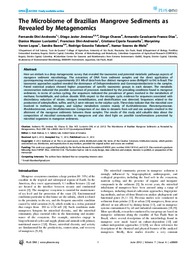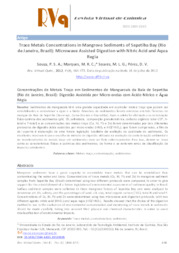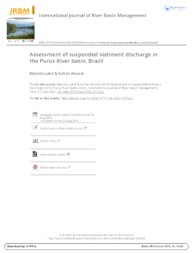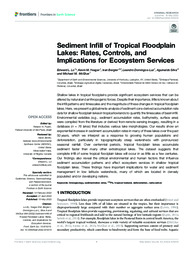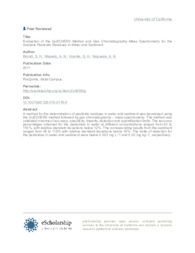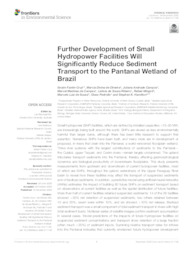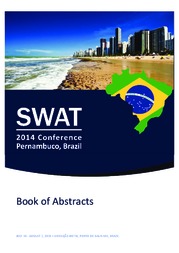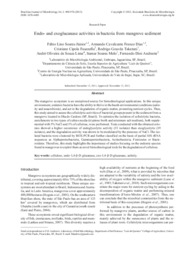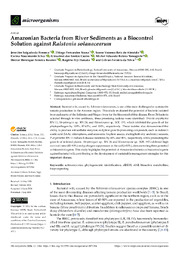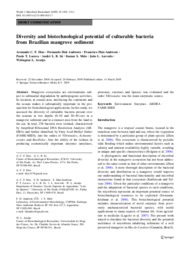Search Publications
Filter by:
| Author(s): ANDREOTE, F. D.; JIMENEZ, D. J.; CHAVES, D.; DIAS, A. C. F.; LUVIZOTTO, D. M.; DINI-ANDREOTE, F.; FASANELLA, C. C.; VARON LOPEZ, M.; BAENA, S.; TAKETANI, R. G.; MELO, I. S. de ABSTRACT: Here we embark in a deep metagenomic survey that revealed the taxonomic and potential metabolic pathways aspects of mangrove sediment microbiology. The extraction of DNA from sediment sample... ... |
| Author(s): SOUZA, P. S. A. de; MARQUES, M. R. C.; SOARES, M. L. G.; PEREZ, D. V. Mangrove sediments have a great capacity to accumulate trace metals that can be remobilized thus contaminating the water and biota. Concentrations of trace metals (Cu, Ni, Pb and Zn) in mangrove sedim... ... |
| |
| Author(s): LO, E. L.; YEAGER, K, M.; BERGIER, I.; DOMINGOS-LUZ, L.; SILVA, A.; MCGLUE, M. M. Shallow lakes in tropical floodplains provide significant ecosystem services that can be altered by natural and anthropogenic forces. Despite their importance, little is known about the infill pattern... ... |
| Author(s): BRONDI, S. H. G.; MACEDO, A. N.; VICENTE, G. H. L.; NOGUEIRA, A. R. de A. A method for the determination of pesticide residues in water and sediment was developed using the QuEChERS method followed by gas chromatography ? mass spectrometry. The method was validated in terms... ... |
| Author(s): FANTIN-CRUZ, i.; OLIVEIRA, M. D. de; CAMPOS, J. A.; CAMPOS, M. M. de; RIBEIRO, L. de S.; MINGOTI, R.; SOUZA, M. L. de; PEDROLLO, O.; HAMILTON, S. K. Small hydropower (SHP) facilities, which are defined by installed capacities <10?50 MW, are increasingly being built around the world. SHPs are viewed as less environmentally harmful than larger dams,... ... |
| Author(s): MARCHIORO, E.; FERNANDES, N.; MACEDO, J.; BHERING, S.; GONCALVES, A.; PRADO, R. The northwestern Rio de Janeiro (RJ-Brazil) area has been going through deep transformations in its soil use and occupation, which has contributed to increased sediment yield and changes in the soil-w... ... |
| Author(s): SOARES JUNIOR, F. L.; DIAS, A. C. F.; FASANELLA, C. C.; TAKETANI, R. G.; LIMA, A. O. S.; MELO, I. S. de; ANDREOTE, F. D. The mangrove ecosystem is an unexplored source for biotechnological applications. In this unique environment, endemic bacteria have the ability to thrive in the harsh environmental conditions (salinit... ... |
| Author(s): FONSECA, J. S. da; SOUSA, T. F.; ALMEIDA, S. V. R. de; SILVA, C. N.; CASTRO, G. dos S.; YAMAGISHI, M. E. B.; KOOLEN, H. H. F.; HANADA, R. E.; SILVA, G. F. da Bacterial wilt, caused by Ralstonia solanacearum, is one of the main challenges for sustainable tomato production in the Amazon region. This study evaluated the potential of bacteria isolated from sed... ... |
| Author(s): DIAS, A. C. F.; ANDREOTE, F. D.; DINI-ANDREOTE, F.; LACAVA, P. T.; SÁ, A. L. B.; MELO, I. S. de; AZEVEDO, J. L.; ARAUJO, W. L. Mangrove ecosystems are environments subject to substantial degradation by anthropogenic activities. Its location, in coastal area, interfacing the continents and the oceans makes it substantially imp... ... |
Observation
Some of Embrapa's publications are published as ePub files. To read them, use or download one of the following free software options to your computer or mobile device. Android: Google Play Books; IOS: iBooks; Windows and Linux: Calibre.
Access other publications
Access the Agricultural Research Database (BDPA) to consult Embrapa's full library collection and records.
Visit Embrapa Bookstore to purchase books and other publications sold by Embrapa.

